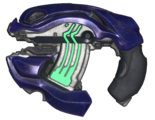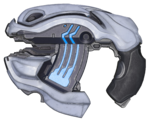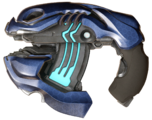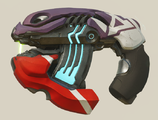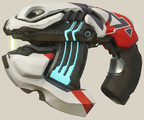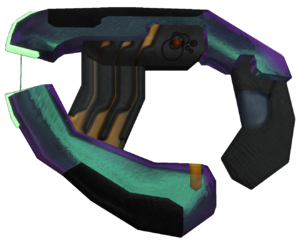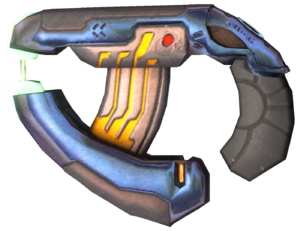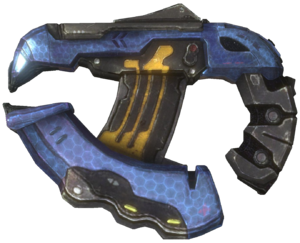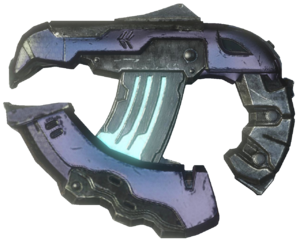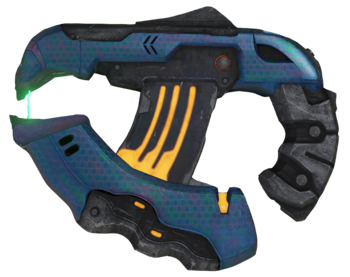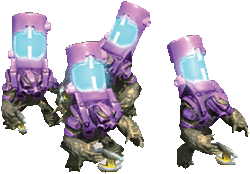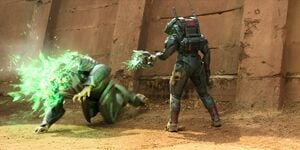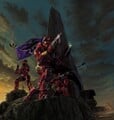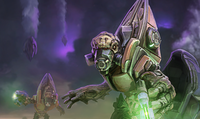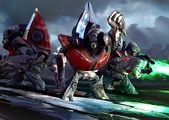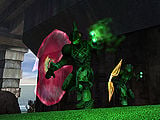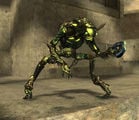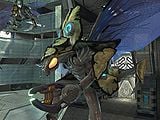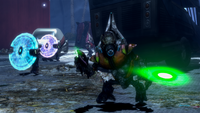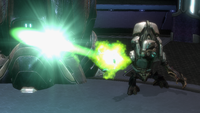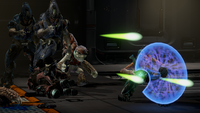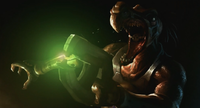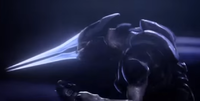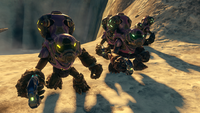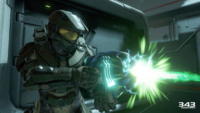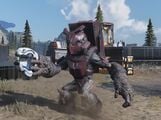Plasma pistol
From Halopedia, the Halo wiki
- "[The plasma pistol] is the bread and butter of Covenant small arms—almost as common as the MA5 is with the UNSC. After the Covenant Carrier jumped there were some areas of Mombasa where plasma pistols covered the ground like leaves—that maneuver killed a bunch of dudes on both sides."
- — Anonymous UNSC E2-BAG/1/7 serviceman[1]
Plasma pistols are a class of single-handed, semi-automatic Covenant infantry directed-energy sidearm manufactured by Assembly Forges and Iruiru Armory.[2][3] The Covenant and its remnants formally designated the plasma pistol as simply pistols,[4][5] while the United Nations Space Command's Office of Naval Intelligence has typically type-classified encountered plasma pistols under the designation of Directed Energy Pistol.[6][7] Nicknames for the plasma pistol include The Little C, Green, Greenboy, Greenie, P-Pistol, and PP.[8][9]
Overview[edit]
Design details[edit]
- "It’s just the right size and it feels good in your hands, but give me an em seven or an em eh five any day of the week."
- — Anonymous UNSC E2-BAG/1/7 serviceman[1]
The general design of the plasma pistol remains consistent across different variants; the weapon is made up of two main components: the upper component, which includes the main rear grip and a firing coil, and the lower component which doubles as the weapon's foregrip—though only humans have been observed to wield the weapon with two hands.[6] As a directed-energy weapon, the plasma pistol fires superheated plasma from its muzzle, where, when the weapon is active, the upper and lower charging poles constantly generate a surge of plasma; on certain variants, the charging poles take on a claw-like appearance.[10][11] The charging poles tend to emit a deep green glow; even at the lowest setting, the firearm is an effective source of light.[12] The top of the weapon contains the upper firing coil; the coil is covered by a hatch, which opens as a venting port,[2] as it lifts and exposes the internal components when the weapon overheats, either from repeatedly firing at its semi-automatic bolts or after discharging a scaled burst.[13] The rear grip features the holographic charge display—a circular progress bar that indicates the weapon charge as it is fired—the display indicates when the weapon is about to overheat from its semi-automatic bursts, or when the weapon is fully charged for a scaled burst.[14][15][16] There is a small button on the left side of the weapon; this exposes the upper firing coil and allows access to the weapon's internal components.[17] Certain variants of the plasma pistol also feature a tracking sight.[13]
The plasma pistol is powered by a battery cell. This battery can be recharged using a variety of power sources,[Note 1] including United Nations Space Command generators, provided an appropriate adaptor is at hand.[2] Plasma pistols have a core power output of 100-150 KV at 2~3 dA, but when overcharged, the power output can reach 1.5 MV @ 2~3 dA.[1]
Operation[edit]
- "The trigger is soft—no feedback—there’s no break that tells you when the overcharge is gonna kick in. First time I did it was on accident and it damn near sprained my wrist."
- — Anonymous UNSC E2-BAG/1/7 serviceman[1]
While weak on its own, the plasma pistol has a wide variety of functions and becomes deadly in large numbers. The plasma pistol has two modes of fire. The first option is rapidly firing the semi-automatic short bursts of plasma; these plasma bolts are capable of quickly degrading dissipative energy shields or vaporizing flesh.[3] The second option is holding down the trigger to overcharge the weapon's energy output and, upon releasing the trigger, the weapon fires a scaled burst—a blast of plasma that briefly tracks a targeted enemy.[6][13] The large bolt from the scaled burst has increased damage, but notably carries a devastating short-range EMP effect that can disabled capacitors in electronic equipment, armor, and vehicles on impact.[2][6] However, after the overcharged bolt is fired, the pistol will automatically overheat. Until it cools down, the pistol cannot be fired again, giving an enemies enough time to counterattack.[10]
Semi-automatic bursts[edit]
When rapidly tapping the trigger, the plasma pistol will fire small bolts of plasma at an exceptional rate of fire.[6] The semi-auto firing mode can be used until the weapon overheats, after which it must cool down for a few seconds before it can be used again. As the weapon approaches low battery, it may sputter and fail to fire.[16] These bolts deal little damage to targets protected by energy shields, though still more than most kinetic weapons. Against unarmored targets, though, the lethality of the plasma pistol is extreme. Injuries inflicted to a victim are severe third-degree burns, this level of injury causes the wound to be cauterized instantly upon impact.[18] Body fluids would be subjected to flash vaporization,[3] inducing a strain or a shock on the body after impact.[19] Fluids trapped in organs or arteries, in addition to the rapid expansion of heat, would cause ruptures or small explosions causing additional damage to the target.[citation needed] Should the plasma bolt strike cover, the impact can cause splash damage by flinging heated debris, though the blast radius is smaller than most Covenant explosive weapons.[20]
Scaled burst[edit]
- "How the foxtrot does it track anything? Whatever—I guess that’s why I carry an em eh five instead of a TACPAD."
- — Anonymous UNSC E2-BAG/1/7 serviceman[1]
If the plasma pistol's trigger is held for a few seconds, the plasma at the charging poles will gather into a large spherical mass. Holding down the trigger continuously drains the battery.[16] Releasing the trigger will fire a single bolt of larger size than usual. This bolt, if aimed correctly, will track its target for a short distance if they attempt to dodge. The overcharged bolt creates an electromagnetic pulse, stunning most electronics and even melting some systems.[21] If the target is protected by energy shields, all but the strongest shields will break, allowing their body to take damage.[9] If the overcharge strikes a vehicle, it will be temporarily disabled and rendered helpless for several seconds.[2] As such, even the weakest Covenant infantry can thwart an assaulting Spartan or a vehicle, forcing their foe to retreat or creating an opening for their allies. Should an overcharged bolt strike an unarmored flesh target, it will result in instant death.[22] During the Battle of Cleveland, Myras Tyla, striking an Unggoy Minor trio with her plasma pistol, disintegrated three Unggoy rapidly from a single overcharged bolt strike.[23]
Development history[edit]
- "It’s a damned ray gun—how come we don’t have ray guns?"
- — Anonymous UNSC E2-BAG/1/7 serviceman[1]
The plasma pistol's origin dates as far back as the Sangheili society before their encounter with the San'Shyuum.[4] Reverse-engineered from a Forerunner tool of indeterminate function,[3] early plasma pistols, such as the Zo'klada-pattern plasma pistol, were designed and forged by the Sangheili centuries prior to the Covenant's formation. Following the Writ of Union, the San'Shyuum incorporated several design improvements to the plasma pistol, including a less volatile plasma generator core and the addition of overcharge safety restrictors, the latter of which granted the function to fire a scaled burst as a large sustained expenditure of energy.[4]
The weapon's success in the field has led to very few change in its design since the earliest models first enter production,[6] though this may also be the result of the San'Shyuum's restrictions over legacy designs,[4] which likely also informed the Covenant's centralized manufacturing control.[3] That being said, there were cases of superficial and functional changes, as the most common plasma pistol design—the Eos'Mak-pattern—is associated with numerous sub-variants.[3]
After the Great Schism and the dissolution of the Covenant, along with its centralized manufacturing control, new variants of the plasma pistols have appeared in a bewildering variety of casing styles and adornments.[3] Furthermore, in the absence of the San'Shyuum's restrictions over legacy design templates, the production of pre-Covenant variants has also resumed.[4]
Usage[edit]
- "It's great in built-up areas and clearing buildings. Anything over a couple dozen meters though? Not so much."
- — Anonymous UNSC E2-BAG/1/7 serviceman[1]
During the early interstellar expansion period of the Sangheili's history, the precursor of the plasma pistol was employed by Sangheili clan warriors during skirmishes on colony worlds.[4] With the formation of the Covenant, the weapon became the standard sidearm for most Covenant infantry.[2][24] The weapon was effective and ideal in close quarters, as it provided a high rate of fire and reasonable accuracy over short distances.[6] It was commonly used by members of the lower caste, such as the Unggoy, Kig-Yar, and Yanme'e; these species are often deployed in groups, making their plasma pistols deadly in high numbers.[4][9] The Kig-Yar and high-ranking Unggoy, like the Ultra, frequently utilized the scaled burst function.[10] Sangheili were known to use the plasma pistol as a sidearm,[25] or even dual-wielding the plasma pistol with an energy sword.[26][27]
Due to their prevalence, plasma pistols were often scavenged by humans from the battlefield;[1][28] even Spartans were known to pick up the plasma pistol from fallen enemies.[9][29][30][31] Plasma pistols were also recovered by humans for personal use; guards in the Eridanus Secundus rebels had concealed plasma pistols in their possession.[32] Although the UNSC first encountered and catalogued the plasma pistol during the first contact with the Covenant in 2525,[3] the exact mechanism by which the plasma pistol functions was still under investigation by the UNSC in 2552, notably being one of the many Covenant weapons featured in Doctor Robert McLees' publication Machines, Materiel and Munitions from the Human-Covenant Conflict, 2525 - Present.[1]
Following the Human-Covenant war, the plasma pistol remains an attractive weapon for both Covenant splinter factions and human criminals, as the weapon is simple to use and requires almost no maintenance.[2] Without the Covenant strict and centralized manufacturing control, both old and new variants of the plasma pistol have become a common sight.[4]
A pair of Sangheili Minors dual-wielding plasma pistols.
An ODST scavenged a plasma pistol and primed its scaled burst.
Three Sangheili armed with plasma pistols during an assault on the UNSC Infinity.
Known types[edit]
Eos'Mak-pattern plasma pistol[edit]
- Main article: Eos'Mak-pattern plasma pistol
The Eos'Mak-pattern plasma pistol, designated by ONI as "Type-25 Directed Energy Pistol",[6][13][33] was the most common variant of the plasma pistol, often utilized by the frontline infantry like the Unggoy, Kig-Yar, and Yanme'e.[4] Within the ONI's designation, however, there are innumerable different sub-classes, much to the consternation of UNSC intelligence officers tasked with categorizing new variants.[3]
An Eos'Mak-pattern sub-variant employed by Fleet of Particular Justice.
An Eos'Mak-pattern sub-variant employed by Fleet of Sacred Consecration.
An Eos'Mak-pattern sub-variant employed by Truth's fleet.
Rohakadu-pattern plasma pistol[edit]
- Main article: Rohakadu-pattern plasma pistol
The Rohakadu-pattern plasma pistol was designed and commissioned per Let 'Volir's requests under a shadow contract between the Banished and Iruiru Armory. While functionally and visually similar to its precursor Zo'klada-pattern plasma pistol, it features slight improvements to its durability and native-link compatibility.[5][34]
- Rohakadu-pattern plasma pistol: This variant of the plasma pistol features slight improvements to its durability and native-link compatibility.[34]
- Unbound Plasma Pistol: A modified variant of the plasma pistol with a white chassis that fires faster, stronger bolts. In addition, its scaled burst fires six bolts instead of a single overcharge bolt; the bolts detonate in a "supercombine" explosion if they hit the same target.[35]
Zo'klada-pattern plasma pistol[edit]
- Main article: Zo'klada-pattern plasma pistol
The Zo'klada-pattern plasma pistol, designated by ONI as "Type-54D Directed Energy Pistol",[7] was one of the original plasma pistol design templates from the Sangheili.[4] Its chassis has a noticeably bulbous design.[36] With the dissolution of the Covenant and the San'Shyuum's restrictions over legacy templates, this variant became a common sight in the Post-Covenant War conflicts,[4][5] particularly in the Blooding Years.[36]
- Zo'klada-pattern plasma pistol: This variant of the plasma pistol features a holographic Smart scope projector on its chassis.[36]
- Spitfire: This improved variant has a higher rate of fire and reduced heat generated per shot.[37]
- Void's Tear: An advanced variant that fires overcharged shots, which create an unstable gravimetric vortex at the point of impact by superheating exotic nuclear isomer. The vortex pulls in nearby objects before exploding.[38]
Gameplay[edit]
Advantages[edit]
The plasma pistol is a great close-to medium range weapon. While it can't inflict high damage at long range, the plasma pistol can be used at a distance if the user fires slowly and aims carefully by leading the target. It is extremely efficient at killing "soft" targets, while dealing large amounts of damage to a heavily armored target. Its overcharge ability is extremely dangerous to shielded infantry, and to non-shielded infantry. Because of the extreme temperatures released, a vehicle running on a hydrogen engine, or one that is lightly covered, can be damaged or disabled if the overcharged bolt hits it — in addition to the high temperatures, the electromagnetic bottle containing the plasma can produce an EMP which can disable any electronic device within range. When compared with the plasma rifle, the plasma pistol's non-overcharged firing mode is far more accurate at medium and long ranges, although the plasma projectiles tend to arc downward at long range. SPARTANs and Sangheili have the ability to dual-wield plasma pistols, doubling their efficiency in close- to mid-range combat situations. If fired fast enough, the high velocity of the plasma projectile coupled with the force of the kinetic impact, can knock over, or stun infantry.
Disadvantages[edit]
The plasma pistol, when fired continuously, or when an overcharged bolt is fired, will overheat because of the rapid cycling, loading, ignition, and release sequence of energy. To prevent the weapon from being damaged, the Type-25 DEP temporarily shuts down and opens a cooling vent to allow the excess heat to dissipate before the weapon reactivates. This process leaves the weapon temporarily inoperable. Infantry who are not aware of the function of the plasma pistol can get killed because of this. Human military experts and scientists do not understand how Covenant plasma weapons work, or how they are recharged; as such when the battery is depleted the plasma pistol must be discarded or replaced. At 10% charge level the plasma pistol will begin to misfire, this is due to the battery's inability to deliver enough energy to start and complete the ignition and release phase of operation. As such this hampers the operators use of the weapon. Continuously holding down the trigger while in overcharge mode will rapidly deplete the energy source, and if not careful the weapon can be wasted before firing a single round. Another disadvantage is its short range which is about 10–25 meters depending on the charge level.
Although the plasma pistol can strike a target at long ranges, it is not suited for long-range combat, due to two distinct properties of the weapon's operation. The first is the rate of thermal expansion which is determined by the rate of the bloom of the bolt; "blooming" is the result of plasma breakdown in the air at energy densities of around a megajoule per cubic centimeter. This effect causes the plasma to defocus and dissolve into the atmosphere. It can be more severe if there is fog, smoke, or dust in the air. As the bolt is accelerated away from the "barrel" of the weapon the plasma begins to decay as a result of the weakening magnetic field. Speed also factors in to this, the faster the bolt is accelerated, the farther the bolt will travel before the temperature of plasma begins to decay and the magnetic field becomes unstable and finally dissipates. As the bolt loses velocity it also loses kinetic damage as it travels longer distances.
Changes[edit]
Halo 2
- Main articles: Halo: Combat Evolved, Halo 2
- The plasma pistol can now be dual-wielded.
- Melee animation changed - instead of the Master Chief holding it in his left hand and punching with his right, he holds it in his right and punches with his left.
- Overcharged shot contrail has been removed.
- Less damage per shot, 26 shots are required to kill a fully-shielded Spartan instead of 15.
- The overcharged bolt does no damage to unshielded targets instead of killing a fully-shielded Spartan in 3 overcharged bolts.
- Rate of fire is slower.
- Overcharge charges up slower but has better tracking.
- Overcharged shots do not kick up as much dirt, dust, sparks and debris as the Halo: Combat Evolved counterpart.
- Green electricity is present between the "prongs" of the Plasma Pistol.
- The color of the plasma pistol (blue) was darkened from Halo: Combat Evolved's version.
- The crosshairs of the reticule move closer together when the overcharge is locked-on to a target.
- The overcharge now takes 15% battery instead of 10-11%.
- The plasma pistol has only 200-300 shots before it runs out of ammo, instead of 500.
- The plasma pistol no longer slows nor stuns targets.
Halo 3
- Main articles: Halo 3, Halo 3:ODST
- Maintaining an overcharge without releasing decreases the battery rapidly (about 3% per second). Overcharges also drain 10% power in addition to the amount decreased when maintaining the charge.
- Takes slightly longer to cool down after overheating.
- If an overcharge impacts with a vehicle, the vehicle is temporarily disabled; same effect as the Power Drain.
- Shorter time to charge an overcharge when holding down the trigger.
- Tracking distance has been lowered; the overcharged bolt will only seek out targets at close range.
- Overcharged bolt has longer contrail than in Halo 2.
- The plasma pistol is marginally weaker than it was in Halo 2, often requiring 1 extra shot to kill most enemies compared with its performance in Halo 2.
- The plasma pistol does the same amount of damage as the assault rifle against unshielded enemies; on Heroic difficulty, both the plasma pistol and assault rifle take 5 shots to kill a Grunt Minor, and 9 shots to kill a Grunt Major or Jackal.
- The plasma pistol now has 400 shots before it runs out of ammo.
- The plasma pistol is now purple instead of blue; it also appears to be smaller than in Halo 2.
Halo 3: ODST
- The plasma bolts in ODST are somewhat smaller and less pronounced than in Halo 3.
Halo: Reach
- Main article: Halo: Reach
- The strength of the plasma pistol has been greatly increased. 10 shots are required to kill a fully-shielded Spartan instead of 26.
- The plasma pistol has received a graphical overhaul with noticeable changes to its design. Its texture appears to be more crudely metallic than in any previous game. Some other changes includes a small raised section on the top, presumably an iron sight and a more defined grip on the lower section.
- Overcharge bolt tracking has been reduced.
- The overcharged bolt creates small area-of-effect damage.
- The pistol produces a faint buzz after you equip it, because of its activation.
- The plasma pistol's rate of fire is reduced to compensate for its higher power.
- Its battery now takes one full energy unit per shot in Multiplayer (five shots in Campaign and Firefight).
- The overcharged bolt not only disables shields, but will also damage around one third of a SPARTAN's health points.
- The overcharge will now drain 15% of the battery per shot (10% in Campaign and Firefight).
- The player will now occasionally melee with the pistol itself, instead of only using their fist.
- Grunts can now use its overcharged function in Campaign and Firefight.
Halo 4
- Main article: Halo 4
- 12 shots are required to kill a fully-shielded Spartan.
- 4 overcharged bolts are required to kill a fully-shielded Spartan (5 with splash damage only).
- Each shot drains 2% of the battery.
- An overcharged shot now drains 20%-25% of the battery, which is much more than previous games.
- Orange markings on the weapon are now bright blue.
- The sounds have been upgraded.
- The normal shots sound sharper.
- The overcharge is higher pitched and no longer buzzes while it's held.
- 360 RPM firing rate for normal shots.
Halo 2: Anniversary
- Main article: Halo 2: Anniversary
- Like the original Halo 2 version, the plasma pistol does not lose battery while being overcharged and cannot disable vehicles. However, it can only be overcharged for 5 seconds before the charge dissipates and loses 9% battery.
- Less damage per shot, requires 26 shots to kill a fully-shielded Spartan.
- Cosmetically resembles the Halo: Reach and Halo 4 variations, most specifically the small "sight" atop the main body of the weapon, and the raised hologram at the rear.
- The overcharge is larger and emits a brighter glow.
- After overheating, the pistol emits a cloud of green steam.
Halo Wars
- Main article: Halo Wars
- Plasma pistols do not drain shields instantly, even when overcharged.
- Grunts now overcharge plasma pistols in-game.
- Jackals are not capable of using them.
- Elites are not capable of using them.
Halo: Spartan Assault and Halo:Spartan Strike
- Main articles: Halo: Spartan Assault, Halo: Spartan Strike
- The maximum battery size is 200 as opposed to 100 in previous games.
- Ammo can be picked up.
- An overcharged shot resembles and behaves similar to that of a Fuel Rod.
Halo Wars 2
- Main article: Halo Wars 2
- The grunt wielding Plasma Pistol cannot be upgraded to wield Needlers.
- Suicide Grunts can no longer wield Plasma Pistol except in Blitz game mode.
- Heavy Grunts wielding the Plasma Pistol shoots red projectiles and does slightly more damage against aircraft.
Non-canon and dubious canon appearances[edit]
Silver Timeline[edit]
| This article contains information about the Silver Timeline, and is not a part of the established Halo canon. |
Plasma pistols are used by the Covenant against humanity.[39][40]
Trivia[edit]
- The plasma pistol was inspired by the "Zeus Class Fusion Pistol" from the Marathon series. Like the Fusion Pistol, the plasma pistol is a reasonable-damage single-shot weapon with an overcharge mode. However, the Fusion Pistol's overcharge was far more deadly in-game and could kill nearly any enemy in the game, with one limitation: if the gun was left overcharged for too long, it would explode violently, killing the wielder.
- In all of the mainline Halo games (except Halo 4), if the player remains idle while wielding a plasma pistol, the player character will pull the top off the pistol, showing the plasma pistol's upper firing coil.
- In Konami's Super Bomberman R, the Plasma Pistol is the weapon and special ability used by the Grunt Bomber.
- The plasma pistol is the main facilitator for the Noob Combo, in which a player uses a plasma pistol's scaled burst to take down the shields of an enemy before using a headshot-capable weapon (such as the BR55 battle rifle) to headshot the unshielded enemy. In Another Day at the Beach from the Halo 2 Multiplayer Map Pack, Butkus and Fones (Marcus Stacker in Halo 2: Anniversary) effectively used this combo to take down a Sangheili that had taken Walpole hostage.
Gallery[edit]

|
Browse more images in this article's gallery page. |
Concept art and illustrations[edit]
Concept art for Halo 2 Multiplayer Map Pack's cover depicting a Spartan dual-wielding a plasma pistol with an SMG.
Two Unggoy Minors wielding Eos'Mak-pattern plasma pistols in Halo: Spartan Assault.
Blitz card art of a trio of Banished Unggoy armed with plasma pistols in Halo Wars 2.
A Sangheili Minor with an Eos'Mak-pattern plasma pistol in Halo: Collateral Damage Issue #1.
A Jiralhanae takes aim with an Eos'Mak-pattern plasma pistol in Halo: Rise of Atriox Issue #5.
Screenshots[edit]
A Kig-Yar snarling with an Eos'Mak-pattern plasma pistol in the Halo 2: Anniversary Terminals.
A Sangheili Storm dual-wielding a plasma pistol with an energy sword in Halo: The Fall of Reach - The Animated Series.
Unggoy Imperials wielding Zo'klada-pattern plasma pistols in Halo 5: Guardians.
John-117 firing a Zo'klada-pattern plasma pistol in Halo 5: Guardians.
Briglard wielding a Rohakadu-pattern plasma pistol in Halo Infinite.
First-person view of John-117 using plasma pistol in Halo: The Television Series.
List of appearances[edit]
Notes[edit]
- ^ While the Halo Encyclopedia (2009 edition) and the Halo Encyclopedia (2011 edition) both state that the plasma pistol's battery cannot be recharged, this was seemingly retconned by Halo: Official Spartan Field Manual.
Sources[edit]
- ^ a b c d e f g h i Bungie.net, Type-25 Directed Energy Pistol (Retrieved on Jan 31, 2021) [local archive] [external archive]
- ^ a b c d e f g Halo: Official Spartan Field Manual, page 187
- ^ a b c d e f g h i j Halo Waypoint, Universe - Weapons - Plasma Pistol (Retrieved on Jan 25, 2021) [local archive] [external archive]
- ^ a b c d e f g h i j k Halo Encyclopedia (2022 edition), page 291
- ^ a b c Halo Encyclopedia (2022 edition), page 478
- ^ a b c d e f g h Halo: The Essential Visual Guide, page 143
- ^ a b Halo Waypoint, Canon Fodder - Locke & Load (Retrieved on Aug 2, 2021) [local archive] [external archive]
- ^ Halo Encyclopedia (2009 edition), page 320
- ^ a b c d Halo Encyclopedia (2011 edition), page 334
- ^ a b c Halo: Reach, gameplay
- ^ Halo 4, gameplay
- ^ Halo: Contact Harvest, chapter 18
- ^ a b c d Halo 4: The Essential Visual Guide, page 84
- ^ Halo: Combat Evolved, gameplay
- ^ Halo 2, gameplay
- ^ a b c Halo 3, gameplay
- ^ Halo Infinite, plasma pistol idle animation
- ^ Halo: The Fall of Reach, page 328
- ^ Halo: The Flood, page 22
- ^ Halo: The Cole Protocol, page 15
- ^ Halo: First Strike, chapter 8
- ^ Halo: The Flood, page 81
- ^ Halo: Uprising, issue 3
- ^ Halo Waypoint, Halo 4 Interactive Guide - Plasma Pistol (Retrieved on May 1, 2013) [local archive] [external archive]
- ^ Halo: First Strike, chapter 7
- ^ Halo: Ghosts of Onyx, Prologue
- ^ Halo: The Fall of Reach – The Animated Series
- ^ Halo 2, campaign level Gravemind
- ^ Halo: Ghosts of Onyx, chapter 15
- ^ Halo: Ghosts of Onyx, chapter 24
- ^ Halo: First Strike, chapter 2
- ^ Halo: First Strike, chapter 28
- ^ Bungie.net, Halo: Reach Ordnance Page (Retrieved on Feb 7, 2021) [archive]
- ^ a b Halo Infinite, gameplay
- ^ Halo Infinite, Forge - Unbound Plasma Pistol description: "Bolts detonate when super-combined on target; over-charge increases detonation and tracking."
- ^ a b c Halo 5: Guardians, gameplay
- ^ Halo 5: Guardians, Spitfire REQ card: "The skill and finesse of Kig-Yar armorers should be never underestimated. Improved Plasma Pistol with faster rate of fire and reduced heat generated per shot."
- ^ Halo 5: Guardians, Void's Tear REQ card: "Superheating exotic nuclear isomers is pure folly, but it was done with the best of intentions. Advanced Plasma Pistol with overcharged shots that create an unstable gravimetric vortex at point of impact, pulling in nearby objects then exploding."
- ^ Halo: The Television Series, episode Contact
- ^ Halo: The Television Series, episode Reckoning
| ||||||||||||||
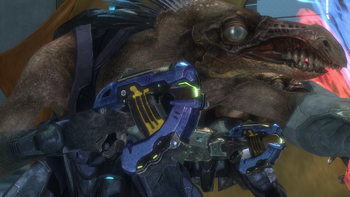
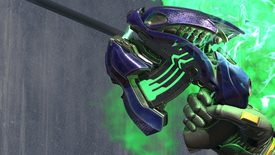
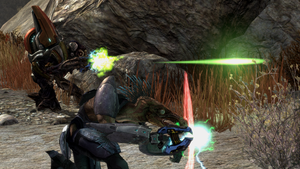
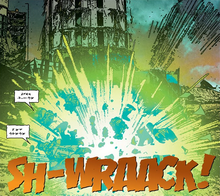
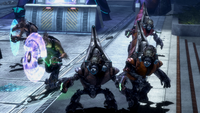
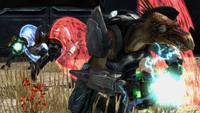
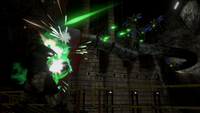
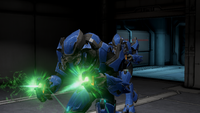

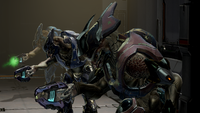
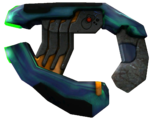
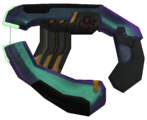
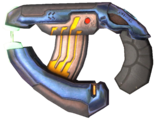
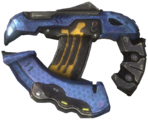
![A Hesduros-manufactured sub-variant.[3]](https://halo.wiki.gallery/images/thumb/9/9d/H4-T25PlasmaPistol-SideRender.png/148px-H4-T25PlasmaPistol-SideRender.png)
